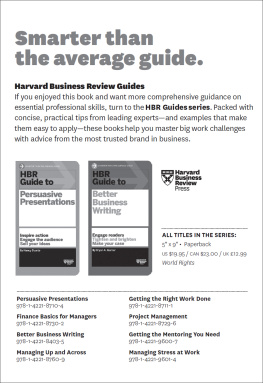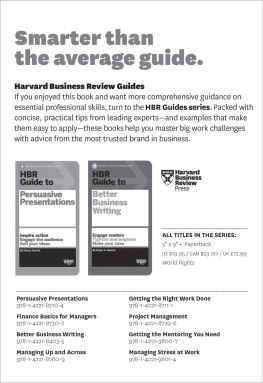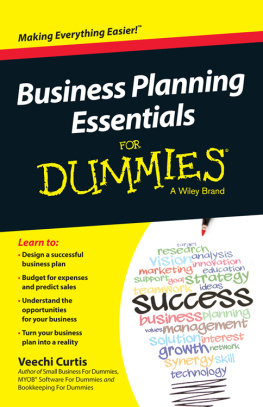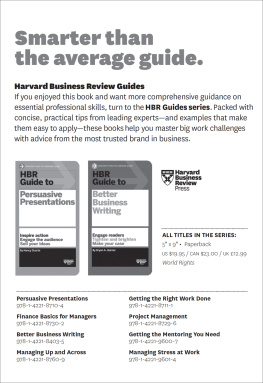Creating Business Plans

Get up to speed fast on essential business skills. Whether youre looking for a crash course or a brief refresher, youll find just what you need in HBRs 20-Minute Manager seriesfoundational reading for ambitious professionals and aspiring executives. Each book is a concise, practical primer, so youll have time to brush up on a variety of key management topics.
Advice you can quickly read and apply, from the most trusted source in business.
Titles include:
Creating Business Plans
http://hbr.org/product/creating-business-plans-20-minute-manager-series/an/16998-PBK-ENG
Delegating Work
http://hbr.org/product/delegating-work-20-minute-manager-series/an/16999-PBK-ENG
Finance Basics
http://hbr.org/product/finance-basics-20-minute-manager-series/an/16864-PBK-ENG
Managing Projects
http://hbr.org/product/managing-projects-20-minute-manager-series/an/16862-PBK-ENG
Managing Time
http://hbr.org/product/managing-time-20-minute-manager-series/an/17001-PBK-ENG
Managing Up
http://hbr.org/product/managing-up-20-minute-manager-series/an/16863-PBK-ENG
Presentations
http://hbr.org/product/presentations-20-minute-manager-series/an/16865-PBK-ENG
Running Meetings
http://hbr.org/product/running-meetings-20-minute-manager-series/an/17003-PBK-ENG

Creating Business Plans
Gather your resources
Describe the opportunity
Get buy-in
HARVARD BUSINESS REVIEW PRESS
Boston, Massachusetts
HBR Press Quantity Sales Discounts
Harvard Business Review Press titles are available at significant quantity discounts when purchased in bulk for client gifts, sales promotions, and premiums. Special editions, including books with corporate logos, customized covers, and letters from the company or CEO printed in the front matter, as well as excerpts of existing books, can also be created in large quantities for special needs.
For details and discount information for both print and ebook formats, contact
Copyright 2014 Harvard Business School Publishing Corporation
All rights reserved
Printed in the United States of America
10 9 8 7 6 5 4 3 2 1
No part of this publication may be reproduced, stored in or introduced into a retrieval system, or transmitted, in any form, or by any means (electronic, mechanical, photocopying, recording, or otherwise), without the prior permission of the publisher. Requests for permission should be directed to or mailed to Permissions, Harvard Business School Publishing, 60 Harvard Way, Boston, Massachusetts 02163.
The web addresses referenced in this book were live and correct at the time of the books publication but may be subject to change.
Library of Congress Cataloging-in-Publication Data
Creating business plans.
pages cm. (20-minute manager series)
Includes index.
ISBN 978-1-62527-222-5
1. Business planning.
HD30.28.C7325 2014
658.401dc23
2014000382
eISBN: 978-1-62527-227-0
Preview
Writing a business plan is an important first step in starting any new venture. Your goal is to provide a detailed description of your new product or service and a concrete strategy for making it a success, while also conveying a hearty dose of enthusiasm that inspires investors and other supporters to want to be involved with your project. This book walks you through the basics:
Articulating your business idea
Communicating your goals
Analyzing the industry
Introducing your management team
Distinguishing your business from rivals
Developing a compelling marketing plan
Describing your businesss daily activities
Providing sound financial projections
Anticipating potential stumbling blocks
Contents
Creating Business Plans
Why Write a Business Plan?
Why Write a Business Plan?
So youve got a brilliant idea for a new product or service. You feel energized, inspired, and ready to forge ahead. Your first challenge: Write a business plan.
You may be thinking: Why should I bother taking the time to draft a formal plan? Shouldnt I just get going already? If youre working at a large company and your boss asks you to put together a plan before you move forward with a new product extension, you may feel equally frustrated. Whats the point of this busywork?, you might think. Why cant I just take the plunge?
Dont fall into this trap. Writing a business plan for internal or external ventures is beneficial in a variety of ways, including gaining buy-in and generating enthusiasm for your idea, improving your odds of successfully creating a new product or service, establishing a company, raising capital, generating sales, and sustaining your business over time.
Whether youre planning to build a new company from scratch, expand an existing firm, spin off from a parent corporation, or even start an initiative within an established organization, writing a business plan gives you an opportunity to thoroughly evaluate your idea. Its also a way for your audiencenamely potential investors, managers, and the people who control vital resources you need to start and operate your businessto assess the feasibility of your concept. Your goal is to create a road map for your business that helps you navigate the opportunities and inevitable obstacles youll face and, perhaps most important, develop strategies to avoid problems before they arise.
This book shows you how to craft a persuasive argument for your idea by walking you through the ele ments of writing a business plan and providing a fully developed primary case study of an imaginary and hypothetical ventureTechnoExercise Corporationwhich well follow throughout the chapters.
Getting started
Most business plans devote too much ink to numbers and too little to the information that matters most to potential investors, according to William Sahlman, a professor at the Harvard Business School and an expert in entrepreneurial ventures. After all, savvy investors understand that financial forecasts for a new companyparticularly detailed, month-by-month projections that extend for years and yearsare typically nothing more than wildly optimistic fantasies. In light of this, Sahlman recommends organizing your business plan around a framework that assesses four factors that are critical to every new venture:
The people. Those who will be starting and running the business, in addition to any outside parties who will provide important resources.
The opportunity. A profile of the business itself: what it will sell and to whom, whether it can grow and how quickly, what its economics are, and what might stand in the way of success.
The context. The big picturethe regulatory environment, interest rates, demographic trends, inflation, and so on. Essentially, factors that inevitably change but that you cannot control.
The risk and reward. An examination of everything that can go wrong and right, as well as a discussion of how the team can respond.
With Sahlmans four critical factors in mind, youre ready to start thinking about what information youll gather to create the most compelling business plan you can. As you begin your research, ask yourself some important questions:
Whats your purpose? If your business plan is a proposal within the resource-rich environment of a large corporation, certain parts of itsuch as the marketing or operations sectionscould be shorter and less developed than other sections. In this case, you ought to focus on the value proposition and competitive analysis. On the other hand, if youre using the plan to raise money from venture capitalists, you ought to focus more on the opportunity itself and the management team.
Next page










